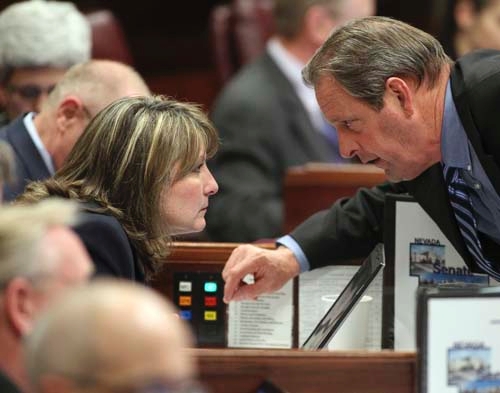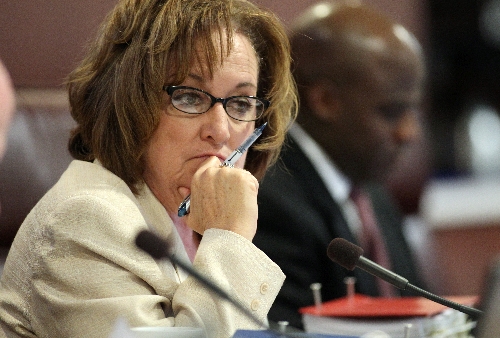Legislative session ends in rare accord



CARSON CITY — The 76th session of the Nevada Legislature, which began in acrimony, ended today in rare harmony.
Democrats and Republicans alike proclaimed respect for GOP Gov. Brian Sandoval, the deal maker who broke his promise not to raise taxes yet gained the respect of lawmakers looking for leadership.
A dozen Republicans in the 63-member Legislature defied the new governor and voted against the budget agreement he brokered with Democratic and GOP leaders. The deal extends $620 million in existing taxes for two years to balance a $6.2 billion general fund.
Despite the Republican division, no GOP lawmakers in the Assembly or Senate delivered fiery opposition speeches but instead said they "agreed to disagree" with Sandoval and their colleagues.
"My vote is not against the governor or anyone else," said Sen. Barbara Cegavske, R-Las Vegas, who explained in a Senate floor speech that she believed she had to stand by her campaign pledge not to raise taxes. "Voters believed me when I said I would not extend the tax increases. We are here to serve the people. When we give our word, they expect us to keep it."
Senate Majority Leader Steven Horsford, D-Las Vegas, too, praised Sandoval and his GOP and Democratic colleagues who agreed to lift the sunsets on a 2009 package of taxes. He said they had saved education and the state from becoming "a sinking ship" as Nevada’s economy struggles to recover from three years of recession.
"In fact, he did what a good governor should do," Horsford said on the Senate floor as lawmakers late Sunday approved $2.2 billion in K-12 education funding. "He brought us together to resolve the state’s problems in a responsible way."
The bipartisan comity was a long time coming. It ended a 120-day session marked by partisan rancor and protests by students, unions and teachers. It bridged deep divisions between Republicans who backed Sandoval’s no-tax stance and Democratic leaders of the Senate and Assembly who sought $1.2 billion in taxes, including the extensions and two new levies on businesses and services.
The sudden turning point came May 26 when the Nevada Supreme Court ruled the state couldn’t use money from a Clark County water fund. Sandoval, a former federal judge and attorney general, believed the ruling blew a gaping $657 million hole in his two-year spending plan, calling into constitutional question funds his state budget had relied on from local governments and other entities.
FIVE DAYS OF TALKS
Thus began five days of intense talks among Sandoval and GOP and Democratic leaders. The sessions, which often stretched into the early morning, resulted in a budget agreement announced Wednesday , less than a week before the session’s scheduled end.
"It’s probably a date none of us will ever forget," Senate Minority Leader Mike McGinness, R-Fallon, said Monday as he supported the tax extension. "A decision to vote for the budget is not an easy one for me, but it will put our state on a path toward fiscal stability."
McGinness was one of four Republicans who joined all 10 Democrats in the 21-member Senate to approve Assembly Bill 561, which extended the $620 million tax package for two years. The three others were Sens. Dean Rhoads, R-Tuscarora; Joe Hardy, R-Boulder City; and Ben Kieckhefer, R-Reno.
The six senators voting against the sunset bill were Cegavske; Greg Brower, R-Reno; Don Gustavson, R-Sparks; James Settelmeyer, R-Minden; and Elizabeth Halseth and Michael Roberson, both R-Las Vegas.
The Senate passed the bill at 11:47 a.m. Monday. Exactly 12 hours earlier, 11:47 p.m. Sunday, the Assembly extended the taxes.
In the lower house, the sunset bill easily got the necessary two-thirds vote margin needed to pass a tax, 36-6. Six of the 16 Republicans in the Assembly voted no: John Ellison, R-Elko; Ed Goedhart, R-Amargosa Valley; John Hambrick, R-Las Vegas; Cresent Hardy, R-Mesquite; Richard McArthur, R-Las Vegas; and Pete Livermore, R-Carson City.
The sunset tax package was the last piece of the budget puzzle to fall into place after lawmakers over the weekend sent to the governor five spending and appropriations bills. The total state spending is $17.4 billion, including federal and highway funds. The governor noted that’s $500 million less than in the last biennium.
LAST-MINUTE PUSH FOR BILLS
There was a great sense of relief Monday in the halls of the Legislative Building, even as lobbyists and lawmakers held marathon meetings, conference committees and floor sessions to sort out which bills would live or die by a 1 a.m. deadline today.
Pete Ernaut, representing the Nevada Gaming Association and other clients, said the last-minute push to save dying bills was like a doctor in the battlefield who suddenly realizes there’s no hope.
"The joke is somebody asks the doctor, ‘Has the bleeding stopped?’ And the doctor says, ‘Yeah, all of it has stopped.’ "
There also was some eleventh-hour mischief making. At about 10 p.m. Assembly Democrats dropped a 122-page bill to put a tax-raising initiative petition on the ballot. Republicans objected and noted Sandoval would veto a bill asking voters to approve a tax on businesses and services.
Dale Erquiaga, the governor’s top adviser, roamed the halls to make sure all the reform bills were making their way to final approval as part of the budget deal Sandoval and Republicans struck.
Many of these bills focused on education and efforts to make sure top teachers remain in the classroom, especially during economic downturns when layoffs can result in young, bright teachers losing their jobs before older problem instructors lost theirs.
Seniority no longer will be the only factor when teachers face layoffs; performance will be considered as well. In addition, collective bargaining agreements can be reopened in bad fiscal times.
Charter schools will get more support from the state, and the governor will appoint the state superintendent of public instruction, while he and lawmakers will pick some Board of Education members instead of all of them being elected.
"We think it was the most significant education reform in a long time," Erquiaga said. "We’re very happy with the session."
Critics have said the reforms don’t go far enough, but educators were pleased to gain more authority over teachers and were happy the final budget didn’t deeply cut education spending.
Joyce Haldeman, the lobbyist for the Clark County School District, on Monday took a walk in the sunshine outside the Legislative Building after days of clouds, dismal rain and freezing temperatures.
"I think all this sun and the lifting of the clouds is symbolic," Haldeman said, throwing up her arms at midafternoon. "From the time of the Supreme Court decision, you saw everyone in the building really come together to reach a compromise and properly fund education. And we got reforms that are almost as important as the funding. This really is a beautiful, beautiful day."
SOME PAY, SOCIAL PROGRAMS CUTS
Not all was sunshine, however.
Teachers and state workers will get a 2.5 percent pay cut under the budget. And Nevada employees must take six unpaid furlough days to save money, which amounts to an additional 2.3 percent pay cut.
Several social programs were cut, including an $11.4 million program to give property tax rebates to poor senior citizens.
Local governments will have to pick up about $14 million in programs dealing with the care and protection of children.
And the governor and lawmakers couldn’t reach agreement on redistricting. Sandoval vetoed two Democratic-drawn plans that Republicans contend violated the Voting Rights Act by packing Hispanics in some legislative districts and by not giving Latinos their own congressional district.
As a result, the maps that states must redraw every 10 years after the new U.S. census count probably will be decided by the courts. Both the Democratic and the Republican parties have filed pre-emptive lawsuits.
Sandoval could call a special session to determine the outlines of the 63 legislative districts and the four U.S. House districts, including a new one to accommodate Nevada’s growing population, now 2.7 million. But Erquiaga said no decision has been made yet.
Democratic leaders also were frustrated with the mining industry, which is booming thanks to the record high price of gold. About $24 million in tax deductions were removed for the industry, including sales taxes. Health care costs also can’t be deducted by the mining industry for the next two years, a restriction that is worth about $12 million to the 2011-13 budget. The prohibition sunsets in 2013.
Also, lawmakers didn’t tackle true tax reform to broaden the base beyond gaming, mining and sales taxes on goods. Democrats made an effort by introducing a proposed margin tax on business and sales tax on services. The package came late in the session, however, and had no GOP support and a veto threat.
Sandoval said he would consider tax changes in the future but wants to consult outside experts to determine the best course.
David Damore, a political science professor at the University of Nevada, Las Vegas, said that although the session ended on time and the budget standoff was broken, lawmakers accomplished little.
"In general, I would say that the session will be remembered as one of missed opportunities," Damore said, adding that the reforms approved were "minor tinkering" and that the budget was patched together with "short-term, bubble gum and bailing wire revenue."
Politically, Sandoval proved a tough negotiator who for most of the session kept Republicans firmly in his camp, said Erik Herzik, a political science professor at the University of Nevada, Reno.
"Governor Sandoval is clearly the leader of the Republican Party," Herzik said. "He’s politely ruthless. He gets what he wants, and people still like him."
The outcome was far different from that of the 2009 session when GOP Gov. Jim Gibbons vetoed a record 48 bills, fought with leaders of his own party and was barely engaged in the process.
PRAGMATISM PREVAILED
Sandoval might pay a political price for breaking his no-tax pledge, but insiders say he has no plans to punish Republicans who opposed him and have to answer to their own constituents. A governor must reach across the aisle or risk failure, Herzik said.
In the end, a pragmatic Sandoval prevailed, knowing that if he didn’t remove the questionable funding from his budget, the state may have faced lawsuits and the need to raise taxes later, Herzik said.
"The story of the session is the Supreme Court pulled both parties from driving over a cliff in a game of chicken," he said. "Sandoval was ready to go to the wall with the Democrats."
Reporters Ed Vogel and Benjamin Spillman contributed to this report. Contact Laura Myers at lmyers@reviewjournal.com.












